windows下Android利用ant自动编译、修改配置文件、批量多渠道,打包生成apk文件
原创文章,转载请注明:http://www.cnblogs.com/ycxyyzw/p/4535459.html
android 程序打包成apk,如果在是命令行方式,一般都要经过如下步骤:




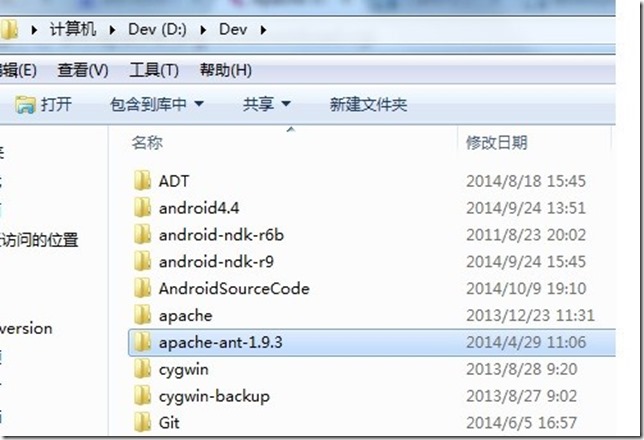
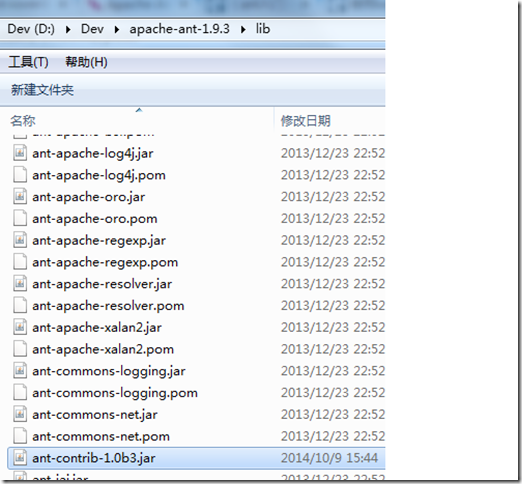
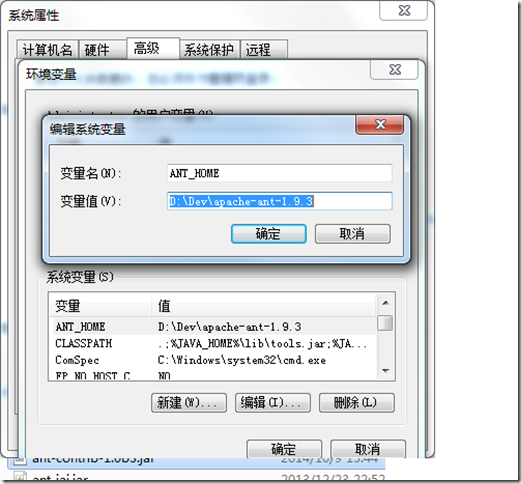

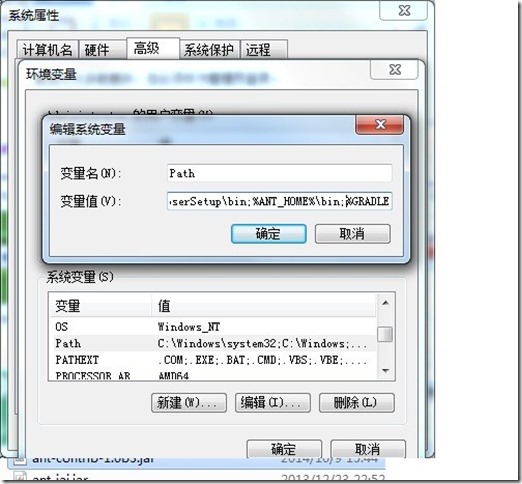



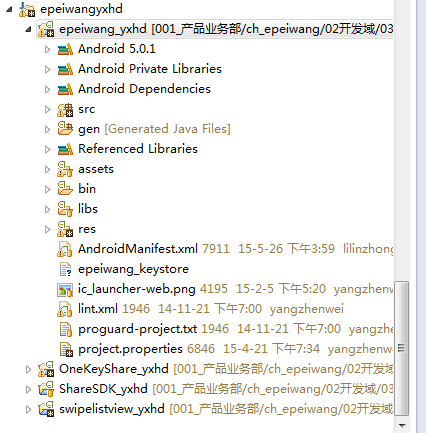


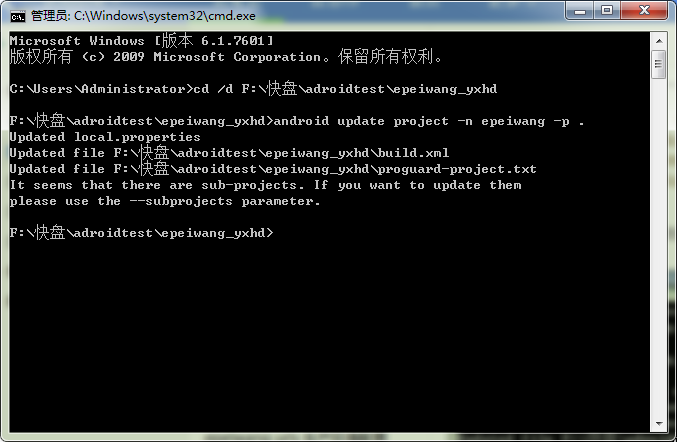
<?xml version="1.0" encoding="UTF-8"?>
<project name="epeiwang" default="help">
<!-- The local.properties file is created and updated by the 'android' tool.
It contains the path to the SDK. It should *NOT* be checked into
Version Control Systems. -->
<property file="local.properties" />
<!-- The ant.properties file can be created by you. It is only edited by the
'android' tool to add properties to it.
This is the place to change some Ant specific build properties.
Here are some properties you may want to change/update:
source.dir
The name of the source directory. Default is 'src'.
out.dir
The name of the output directory. Default is 'bin'.
For other overridable properties, look at the beginning of the rules
files in the SDK, at tools/ant/build.xml
Properties related to the SDK location or the project target should
be updated using the 'android' tool with the 'update' action.
This file is an integral part of the build system for your
application and should be checked into Version Control Systems.
-->
<!-- 此文件需要我们自己创建-->
<property file="ant.properties" />
<!-- if sdk.dir was not set from one of the property file, then
get it from the ANDROID_HOME env var.
This must be done before we load project.properties since
the proguard config can use sdk.dir -->
<property environment="env" />
<condition property="sdk.dir" value="${env.ANDROID_HOME}">
<isset property="env.ANDROID_HOME" />
</condition>
<!-- The project.properties file is created and updated by the 'android'
tool, as well as ADT.
This contains project specific properties such as project target, and library
dependencies. Lower level build properties are stored in ant.properties
(or in .classpath for Eclipse projects).
This file is an integral part of the build system for your
application and should be checked into Version Control Systems. -->
<loadproperties srcFile="project.properties" />
<!-- quick check on sdk.dir -->
<fail
message="sdk.dir is missing. Make sure to generate local.properties using 'android update project' or to inject it through the ANDROID_HOME environment variable."
unless="sdk.dir"
/>
<!--
Import per project custom build rules if present at the root of the project.
This is the place to put custom intermediary targets such as:
-pre-build
-pre-compile
-post-compile (This is typically used for code obfuscation.
Compiled code location: ${out.classes.absolute.dir}
If this is not done in place, override ${out.dex.input.absolute.dir})
-post-package
-post-build
-pre-clean
-->
<!-- 此文件需要我们自己创建-->
<import file="custom_rules.xml" optional="true" />
<!-- Import the actual build file.
To customize existing targets, there are two options:
- Customize only one target:
- copy/paste the target into this file, *before* the
<import> task.
- customize it to your needs.
- Customize the whole content of build.xml
- copy/paste the content of the rules files (minus the top node)
into this file, replacing the <import> task.
- customize to your needs.
***********************
****** IMPORTANT ******
***********************
In all cases you must update the value of version-tag below to read 'custom' instead of an integer,
in order to avoid having your file be overridden by tools such as "android update project"
-->
<!-- version-tag: 1 -->
<!-- 表示我们引用了sdk的ant的build文件-->
<import file="${sdk.dir}/tools/ant/build.xml" />
</project>
#keystore文件存放目录
key.store=./epeiwang_keystore
#keystore别名
key.alias=epeiwang_keystore
#keystore密码
key.store.password=xxxxxxx
#组织密码
key.alias.password=xxxxxxxx
#如果还没有生成keystore证书,可以使用下面命令在项目目录下生成一个test.keystore证书文件
#generate test.keystore
#keytool -genkey -alias test.keystore -keyalg RSA -validity 20000 -keystore test.keystore
#apk.dir表示存放最终生成apk的目录
apk.dir=./apk
#定义项目名称
app.name=epeiwang
#渠道号,多个渠道号用逗号分隔,每个渠道号不要使用违规字符例如/:等,因为渠道号会在打包的时候放在apk的文件名中,所以包含#违规字符将无法生成最终的apk,哥就是被这个细节给坑了一个下午。这里定义了两个渠道号myapp-12345和BAI-3s322d
market_channels=epeiwang,baidu,91
#测试环境服务器配置
test.server.url=192.168.1.10/epeiwang
test.server.image.url=192.168.1.9
test.epeiwang.url=192.168.1.10
#生产环境服务器配置
rel.server.url=111.111.111.222/epeiwang
rel.server.image.url=111.111.111.229
rel.epeiwang.url=www.epeiwang.com
#测试环境标识 给apk命名的时候用
test.tag.name=test
#生产环境标识 给apk命名的时候用
release.tag.name=release
<?xml version="1.0" encoding="UTF-8"?>
<project name="custom_rules" >
<!-- 引用ant-contlib这个扩展包,声明一下 -->
<taskdef resource="net/sf/antcontrib/antcontrib.properties" >
<classpath>
<pathelement location="${ant.ANT_HOME}/lib/ant-contrib-1.0b3.jar" />
</classpath>
</taskdef>
<!-- 定义一个时间变量,打完包后跟渠道号一起命名apk -->
<tstamp>
<format
pattern="yyyyMMddhhmm"
property="pktime"
unit="hour" />
</tstamp>
<!-- 创建apk存放目录 -->
<mkdir dir="${apk.dir}" >
</mkdir>
<!-- 替换参数 然后打包APK -->
<target name="replace_parameter" >
<!-- 替换服务器配置 -->
<replaceregexp
byline="false"
encoding="UTF-8"
flags="g" >
<!-- 这个是正则表达式匹配hostconfig中epeiwang_server的值 -->
<regexp pattern="epeiwang_server>(.*)</epeiwang_server" />
<substitution expression="epeiwang_server>${server_url}</epeiwang_server" />
<fileset
dir=""
includes="res/xml/hostconfig.xml" />
</replaceregexp>
<replaceregexp
byline="false"
encoding="UTF-8"
flags="g" >
<!-- 这个是正则表达式匹配hostconfig中epeiwang_img_server的值 -->
<regexp pattern="epeiwang_img_server>(.*)</epeiwang_img_server" />
<substitution expression="epeiwang_img_server>${server_image_url}</epeiwang_img_server" />
<fileset
dir=""
includes="res/xml/hostconfig.xml" />
</replaceregexp>
<replaceregexp
byline="false"
encoding="UTF-8"
flags="g" >
<!-- 这个是正则表达式匹配hostconfig中epeiwang_url的值 -->
<regexp pattern="epeiwang_url>(.*)</epeiwang_url" />
<substitution expression="epeiwang_url>${epeiwang_url}</epeiwang_url" />
<fileset
dir=""
includes="res/xml/hostconfig.xml" />
</replaceregexp>
</target>
<!-- 打包测试环境命令就用这个 -->
<target name="deploytest" >
<!-- 传服务器配置参数到 replace_parameter这个打包target -->
<antcall target="replace_parameter" >
<param
name="server_url"
value="${test.server.url}" />
<param
name="server_image_url"
value="${test.server.image.url}" />
<param
name="epeiwang_url"
value="${test.epeiwang.url}" />
</antcall>
<!-- 执行循环打包target foreach_replacechannel -->
<antcall target="foreach_replacechannel" >
<!-- apk命名时候用到的参数 -->
<param
name="deploy_environment"
value="${test.tag.name}" />
</antcall>
</target>
<!-- 打包生产环境命令就用这个 -->
<target name="deployrel" >
<!-- 传服务器配置参数到 replace_parameter这个打包target -->
<antcall target="replace_parameter" >
<param
name="server_url"
value="${rel.server.url}" />
<param
name="server_image_url"
value="${rel.server.image.url}" />
<param
name="epeiwang_url"
value="${rel.epeiwang.url}" />
</antcall>
<!-- 执行循环打包target foreach_replacechannel -->
<antcall target="foreach_replacechannel" >
<!-- apk命名时候用到的参数 -->
<param
name="deploy_environment"
value="${release.tag.name}" />
</antcall>
</target>
<!-- 循环打包的target -->
<target name="foreach_replacechannel" >
<!-- 开始循环打包,从market_channels参数中取出一个渠道号用channel标识,然后通过正则修改manifest文件 -->
<foreach
delimiter=","
list="${market_channels}"
param="channel"
target="modify_manifest" >
</foreach>
</target>
<target name="modify_manifest" >
<replaceregexp
byline="false"
encoding="UTF-8"
flags="g" >
<!--
这个是正则表达式匹配manifest中meta,我用的友盟的统计,我 AndroidManifest中的配置为:
<meta-data android:value="360shichang" android:name="UMENG_CHANNEL"
-->
<regexp pattern="android:value="(.*)" android:name="UMENG_CHANNEL"" />
<substitution expression="android:value="${channel}" android:name="UMENG_CHANNEL"" />
<fileset
dir=""
includes="AndroidManifest.xml" />
</replaceregexp>
<!-- 这里设置最终生成包的存放目录以及apk的名称,注意这里是文件名称,所以变量中不允许出现违规字符,否则将无法生成最终的apk(会出现output is not valid 的错误) -->
<property
name="out.final.file"
location="${apk.dir}/${app.name}_${channel}_${deploy_environment}_${pktime}.apk" />
<antcall target="clean" />
<antcall target="release" />
</target>
</project>
<?xml version="1.0" encoding="UTF-8"?>
<!-- 为了ant打包时候正则匹配,请不要格式化该文件 -->
<hostconfig>
<epeiwang_server>1111.1111.1111.1/epeiwang</epeiwang_server>
<epeiwang_img_server>1111.1111.1111.1</epeiwang_img_server>
<epeiwang_url>www.epeiwang.com</epeiwang_url>
</hostconfig>







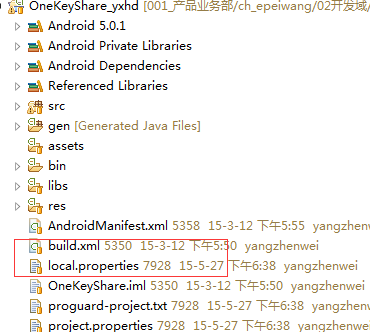

windows下Android利用ant自动编译、修改配置文件、批量多渠道,打包生成apk文件的更多相关文章
- linux(以ubuntu为例)下Android利用ant自动编译、修改配置文件、批量多渠道,打包生成apk文件
原创,转载请注明:http://www.cnblogs.com/ycxyyzw/p/4555328.html 之前写过一篇<windows下Android利用ant自动编译.修改配置文件.批量 ...
- Android 自动编译、打包生成apk文件 3 - 使用SDK Ant方式
相关文章列表: < Android 自动编译.打包生成apk文件 1 - 命令行方式> < Android 自动编译.打包生成apk文件 2 - 使用原生Ant方式> &l ...
- Android 自动编译、打包生成apk文件 2 - 使用原生Ant方式
from://http://blog.csdn.net/androiddevelop/article/details/11100109 相关文章列表: <Android 自动编译.打包生成apk ...
- Android 自动编译、打包生成apk文件 4 - 多渠道批量打包
相关文章列表: < Android 自动编译.打包生成apk文件 1 - 命令行方式> < Android 自动编译.打包生成apk文件 2 - 使用原生Ant方式 > < ...
- 使用ant自动编译、打包生成apk文件
上次使用命令行生成apk文件<Android 命令行编译.打包生成apk文件>,学习命令行生成的目的是为了编写ant打下基础. 一. ant环境 下载ant包,配置环境变量 二.ant编译 ...
- 在eclipse中将android工程打包生成apk文件
1.)生成keystore 按照下面的命令行 在C:\Program Files\Java\jdk1.6.0_10\bin>目录下,输入keytool -genkey -alias androi ...
- Android 命令行编译、打包生成apk文件
一.搭建搭建环境 1. 安装JDK 和 Android SDK 2. 配置环境变量 D:\android-sdk-windows\tools C:\Program Files\Java\jdk1. ...
- Ant自动编译打包&发布 android项目
Eclipse用起来虽然方便,但是编译打包android项目还是比较慢,尤其将应用打包发布到各个渠道时,用Eclipse手动打包各种渠道包就有点不切实际了,这时候我们用到Ant帮我们自动编译打包了. ...
- Android - Ant自动编译打包android项目 -- 1(转)
1. 背景: Eclipse用起来虽然方便,但是编译打包android项目还是比较慢,尤其当要将应用打包发布到各个渠道时,用Eclipse手动打包各种渠道包就有点不切实际了,这时候我们用到Ant帮我 ...
随机推荐
- log-malloc2 0.2.4 发布
log-malloc2 0.2.4 发布了,该版本修复了日志格式输出的 bug. og-malloc2 是一个 malloc 日志预加载库,用于检测内存泄漏问题.
- 《Linux内核设计与实现》读书笔记(十八)- 内核调试
内核调试的难点在于它不能像用户态程序调试那样打断点,随时暂停查看各个变量的状态. 也不能像用户态程序那样崩溃后迅速的重启,恢复初始状态. 用户态程序和内核交互,用户态程序的各种状态,错误等可以由内核来 ...
- 【原创】Windows Server 文件夹权限小问题
服务器:Windows Server 2008 R2 Standard 做文件服务器 问题:在资源管理器里给账号设置了R/W权限,但是一直有问题,写失败. 解决:需要在server manager-r ...
- AngularJS快速入门指南04:指令
AngularJS通过指令将HTML属性进行了扩展. AngularJS指令 AngularJS指令是带有ng-前缀的扩展HTML属性. ng-app指令用来初始化AngularJS applicat ...
- [iOS]The app icon set named "AppIcon" did not have any applicable content.
Develop Tools: xCode 5.1 I write a demo for app settings feature. The tutorial url is here. When I a ...
- jquery的height()和javascript的height总结,js获取屏幕高度
jquery的height()和javascript的height总结,js获取屏幕高度 2014年9月18日 15048次浏览 引子 今天是九一八事变八十三周年,大家勿忘国耻!加油学习!经济和技术等 ...
- paip.提升性能---并行多核编程哈的数据结构list,set,map
paip.提升性能---并行多核编程哈的数据结构list,set,map vector/copyonwritearraylist 都是线程安全的. 或者经过包装的list ::: collection ...
- javascript实例——时间日期篇(包含5个实例)
本来想在网上找一些js实例来练练手,结果发现一本书<突破JavaScript编程实例五十讲>,看了下内容还不错,就下了下来: 后面又下了该书籍的源码,一看才发现这本书编的日期是2002年的 ...
- Prototype in JavaScript
声明 本文旨在入门,简单了解下何为prototype & __proto__ 原型对象 我们创建每个函数都有个prototype(原型)属性,该属性是一个指针,指向一个对象,而这对象的用途是包 ...
- WPS 文字排版 标题回车后标题号自动增加
飞思卡来互联网提供全球性的 看了看 风格的呵呵 合格否d合格否的 secure embedded嵌入式解 个国家和地区,注册了成千上万项专利,产品面向 物联网,汽车电子,消费电子,工业及网络设备等市 ...
